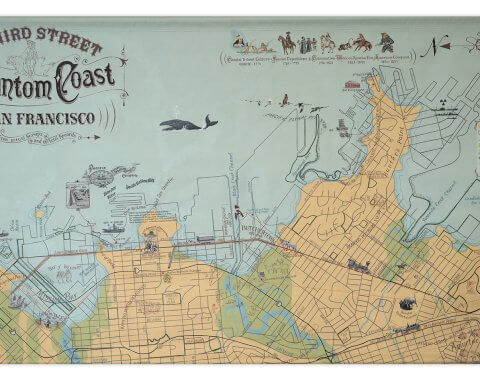
Since the public health crisis began last year demand for furry friends has exploded. Thousands of people have signed up to foster an animal at the San Francisco Society for Prevention of Cruelty to Animals (SF SPCA). Muttville Senior Dog Rescue and other animal rehoming agencies have been deluged with applicants.
This outpouring of pet love will ultimately lead to the need to cope with the animal’s remains once it dies.
After a dog or cat passes its body can be handled in various ways. Humans unable to bury their animal on private property can request disposal by San Francisco Animal Care and Control (ACC), ask their veterinarian to deal with the corpse, or direct the deceased to a suitable cemetery or crematory, such as Pet’s Rest, in Colma, or Bubbling Well, in Napa.
The bereaved can make an appointment with ACC to bring in the body or ask that an officer pick it up. Disposal costs are $23; pickup is $60, said Martha DeLeon, ACC shelter service representative. If the animal is a stray its location can be conveyed to ACC or the corpse delivered to the facility.
According to DeLeon, precautionary measures should be taken during the COVID-19 pandemic. For pickup, the body should be placed outside the residence. For drop-off, the corpse should be positioned in front of ACC’s 15th Street facility on a bench, notifying ACC of the arrival through the entrance intercom.
It’s illegal to bury, leave, or dispose of a deceased pet in a public park or public waters, with a $250 to $1,000 fine for a first conviction.
Those with access to private property can use it for burials. An animal that died of a contagious or infectious disease must be interred at least 500 feet away from any residences. An animal grave should be three to four feet deep, to reduce health risks and the chance that scavengers or rain will disturb it. Water, electric, and gas lines should be avoided.
Lap of Love offers a free national pet loss hotline. SF SPCA hosts a complimentary grief support group facilitated by Shaina Madfes and Sharleen Phillips, volunteers who are registered associate marriage and family therapists. Madfes and Phillips facilitate the group, but it isn’t therapy; it’s a space to share experiences about an animal’s passing. The group currently meets on Zoom.
“The support group provides space for folks to share whatever feels most helpful, memories of animal companions, experiences with loss and death, and both challenges and successes with coping with grief,” said Madfes.
Participants are invited to distribute photographs and videos of their animals.
“Adults of all ages residing in California are welcome. Individuals are asked to share their current location privately with a facilitator for safety purposes…first name and name of their pet with the group. We ask that one person speak at a time. Then other people can offer support. Participants allow each other equal time to talk,” said Phillips.
Madfes said the group includes individuals who have lost companion or service animals due to death or because they had to rehome it.
Phillips and Madfes began attending the group in 2017, then led by University of San Francisco (USF) professor, Dr. Cori Bussolari, a specialist in pediatric health psychology and bereavement. The group was originally created by Dr. Betty Carmack, USF professor emerita in nursing and author of Grieving the Death of a Pet. Madfes and Phillips are former students of Bussolari.
“I love that there is this free service and a space to talk about grief over losing a pet,” said Phillips. “Shaina and I shadowed Dr. Bussolari for two years prior to taking over the group. This time helped me better understand how to create a safe space to hold people’s loss and emotions.”
The COVID-19 pandemic has changed experiences regarding pet loss. “COVID-19 protocols at veterinary clinics may make it difficult for a person to be with an animal when the animal is ailing and/or being euthanized. In addition, individuals who are working outside the home more than usual may feel guilt and sadness due to being less present for their animals at the end of their lives. Those folks who are working inside the home now may experience a great sense of loss due to the increased physical closeness with their animals. For all people experiencing loss during this time, grief may be more challenging…due to increased isolation and less access to coping strategies like going to the gym, dinners with friends, or seeing family,” said Madfes.
“Our animal companions are members of our family. For older people, a pet has seen us through challenging and difficult times, like an illness or divorce or raising children. Pets are the historians of our lives,” said Carmack. “To lose an animal during this time, understandably, can intensify the grief. The grief you experience after a pet is gone can be even more intense than the grief you feel when you lose a friend or family member. It’s very individualized and each person’s journey of grief is different. If it’s hard for you to get through a day without crying, know that’s not unusual. Take that time for yourself.”
Carmack added that it can be important to mark one’s beloved animal companion, by performing a ritual or creating a memorial, such as a scrapbook, journal, or lighting a candle. “It also might be helpful to plant a tree, bush, or other plant, or make a donation in your animal’s honor. You can also send out a memorial notice to friends and family or post a memorial on social media,” she said.
The San Francisco Parks Alliance offers a way to honor a pet with a plaque through its Commemorative Bench Program. “There are not specific areas in parks dedicated to pets. The locations are driven by donors’ preference for a location,” said Paula Martin, Alliance bench program manager.
Martin said the Music Concourse in Golden Gate Park, Alta Plaza Park, Bernal Heights Park and Precita Park are popular spots for memorial benches. “First, a pet owner selects two or three areas meaningful to them. Then I research the availability of the spot. San Francisco Rec and Parks confirms availability and completely restores the bench. RPD carpenters repair it, clean it, and remove graffiti,” said Martin.
According to Martin, a commemorative bench requires a $6,000 donation for a 10-year term, five lines of text with 25 characters. The letters can be in different languages and include images like a heart or the silhouette of a dog breed.
“These memorials are very personal and meaningful to the people that select them. For example, there’s a bench near Spreckels Lake that memorializes Ann, an owner, and Buster, her dog. Ann and Buster used to walk there every day. The bench is a place that everyone who knew her or Buster can visit and remember them,” said Martin.
Pets can be honored by contacting professionals who knew the animal, said Michelle Barrera, general manager of Pet Camp, a daycare and overnight boarding facility with two San Francisco locations.
“Know that you are not alone, and there’s a whole group of people who knew and loved your pet too…are grieving along with you and wish you the best,” said Barrera.
According to Barrera, a challenging aspect of losing a pet can be helping other animals deal with the loss. “I have a big, beautiful, black and white pit bull named Magoo. For the first years of his life, he lived with my older cat, Nina. When she died, he lost his support,” said Barrera.
Barrera said Magoo was more wary after Nina’s death. “She provided him with comfort, so I stepped in to reassure him and create that sense of consistency,” said Barrera. “One thing that I have found that works is to stay positive around them. Continue the routines you had before, like walking them or feeding them at a regular time. Gradually they will regain that trust and rebuild their confidence.”



